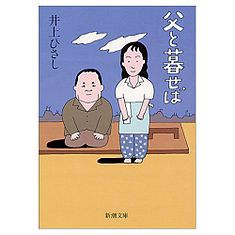- The Face of Jizo
-
Chichi to Kuraseba
(The Face of Jizo)Written by Hisashi Inoue Date premiered September 3, 1994 Original language Japanese Chichi to Kuraseba 
The Face of Jizo
Die Tage mit Vater
Mio Padre

Chichi to Kuraseba (The Face of Jizo)Author(s)  Hisashi Inoue
Hisashi InoueOriginal title Chichi to Kuraseba Translator  Roger Pulvers
Roger Pulvers
 Isolde Asai
Isolde Asai
 Franco Gervasio, Ai Aoyama
Franco Gervasio, Ai AoyamaCountry  Japan
JapanLanguage Japanese Publisher Shinchosha Publication date January 2001 Published in
EnglishAugust 2004 Pages  126,
126,  191
191ISBN  ISBN 4101168288, ISBN 978-4101168289
ISBN 4101168288, ISBN 978-4101168289
 ISBN 4990211502, ISBN 978-4990211509
ISBN 4990211502, ISBN 978-4990211509Chichi to Kuraseba (The Face of Jizo) 
Chichi to Kuraseba (The Face of Jizo)Directed by Kazuo Kuroki Written by Hisashi Inoue Starring Rie Miyazawa
Yoshio Harada
Tadanobu AsanoCinematography Tatsuo Suzuki Release date(s) July 31, 2004 Running time 99 min. Country  Japan
JapanLanguage Japanese The Face of Jizo (父と暮せば Chichi to Kuraseba) is a Japanese play written by Hisashi Inoue.
Contents
Plays
- It was performed by Komatsuza as their 34th Play, from September 3 to September 18 in 1994, directed by Hitoshi Uyama, starring by Masayo Umezawa and Kei Suma[1]. Then has been is performed frequently not only all over Japan but also overseas. Paris in 1997, Moscow in 2001, Hong Kong in 2004 and London in 2007[2][3].
- Now, the play is performed by Komatsuza and some theatrical companies.
Books
The play Chichi to Kuraseba (Living with my Father) is published by Shinchosha in 2001[4].
The play was transferred into three languages and published by Komatsuza.
- The Face of Jizo in English by Roger Pulvers in 2004[5].
- Die Tage mit Vater (The Day with Father) in German by Isolde Asai in 2006.
- Mio Padre (My Father) in Italian by Franco Gervasio and Ai Aoyama in 2006,.
CD
The play is recorded for a CD with starring Tomoko Saito and Kei Masu, published by Shinchosha, on April 25 in 2003[6].
Film
The play is adapted for a film "Chichi to Kuraseba" directed by Kazuo Kuroki, starring by Rie Miyazawa, Yoshio Harada and Tadanobu Asano, in 2004. It was filmed as the 3rd and concluding volume of Kazuo Kuroki's "Trilogy works for War Requiem".
The story goes with the conversations between a daughter, a survivor of the atomic bombing and her father's ghost like a rapid-fire two-man act in attractive Hiroshima dialect. But, it is also the daughter's anguish to be acquitted from the fact that she could be survived but her father couldn't.
Plot
Three years after the atomic bombing, there is a young female librarian in Hiroshima. Her name is "Mitsue" who lost her father by the atomic bombing, and he was her only family member.
Mitsue as a survivor, living alone, feeling sad and missing her father.
One day, a young man visit her library to study and find the morgue of the atomic bombing. Then Mitsue and the young man will meet and be attracted by each other. But, when Mitsue think about her father, she feels "I cannot be happy", so, when he asked her go out, Mitsue will try to refuse him.
At that night, her father Takezo's ghost will appear at Mitsue to cheer her up, then Takezo will begin to try to open Mitsue's heart, because he wants her to be happy and hopes to have a chance to fall in love with the young man.
Cast
- Rie Miyazawa as "Mitsue Fukuyoshi", a young lady.
- Yoshio Harada as "Takezo Fukuyoshi", a ghost of Mitsue's father.
- Tadanobu Asano as "Masa Kinoshita", a young man.
Awards[7]
- 2004, 28th Yamaji Fumiko Film Award to Kazuo Kuroki and 18th Yamaji Fumiko Actress Award to Rie Miyazawa by Yamaji Fumiko Cultural Foundation[8]
- 2004 Nikkan Sports Film Award - Best Director to Kazuo Kuroki
- 2004 Hochi Film Award - Best Supporting Actor to Yoshio Harada
- 2004 Asahi Best Film Festival - 2nd Prize of Japanese Film
- 2004 Kinema Junpo - Best Actress to Rie Miyazawa
- 2004 Kinema Junpo - 4th Prize of Japanese Film
- 2004 Mainichi Film Award - Best Director to Kazuo Kuroki
- 2004, 47th Blue Ribbon Awards - Best Actress to Rie Miyazawa[9],[10]
- 2004 Japanese Film Pen Club Award - 1st Prize of Japanese Film
- 2005 Yokohama Film Festival - Special Prize to Kazuo Kuroki
See also
References
- ^ Komatsuza 34th Play - Chichi to Kuraseba
- ^ Performing Father–Daughter Love "Inoue Hisashi's Face of Jizo" by Tomoko Aoyama
- ^ "The Face of Jizo" at Arcola Theatre in London, 2007
- ^ ISBN 4101168288, ISBN 978-4101168289
- ^ ISBN 4990211502, ISBN 978-4990211509
- ^ ISBN 978-4-10-830126-9
- ^ TV Tokyo Media Net
- ^ Yamaji Fumiko Cultural Foundation
- ^ 2004 Blue Ribbon Awards on Cinem@Hochi
- ^ 2004 Blue Ribbon Awards on allcinema
External links
- Komatsuza
- The Face of Jizo The public reading events in Toronto and Vancouver, 2004–2006
- The Face of Jizo at Arcola Theatre in London, 2007
- The Face of Jizo Play of the Month of The Japan Foundation, in August 2007
- Performing Father–Daughter Love "Inoue Hisashi's Face of Jizo" by Tomoko Aoyama
- Chichi to Kuraseba - TV Tokyo Medianet - rerun the film at Iwanami hall in 2005
- Chichi to Kuraseba
Categories:- Japanese-language films
- Japanese plays
- 1994 plays
- Japanese books
- 2001 books
- 2004 books
- 2006 books
- Japanese films
- 2004 films
- Plays about the atomic bombings of Hiroshima and Nagasaki
- Books about the atomic bombings of Hiroshima and Nagasaki
- Films about the atomic bombings of Hiroshima and Nagasaki
- Films set in Hiroshima
- Films shot in Hiroshima
- Films directed by Kazuo Kuroki
Wikimedia Foundation. 2010.
